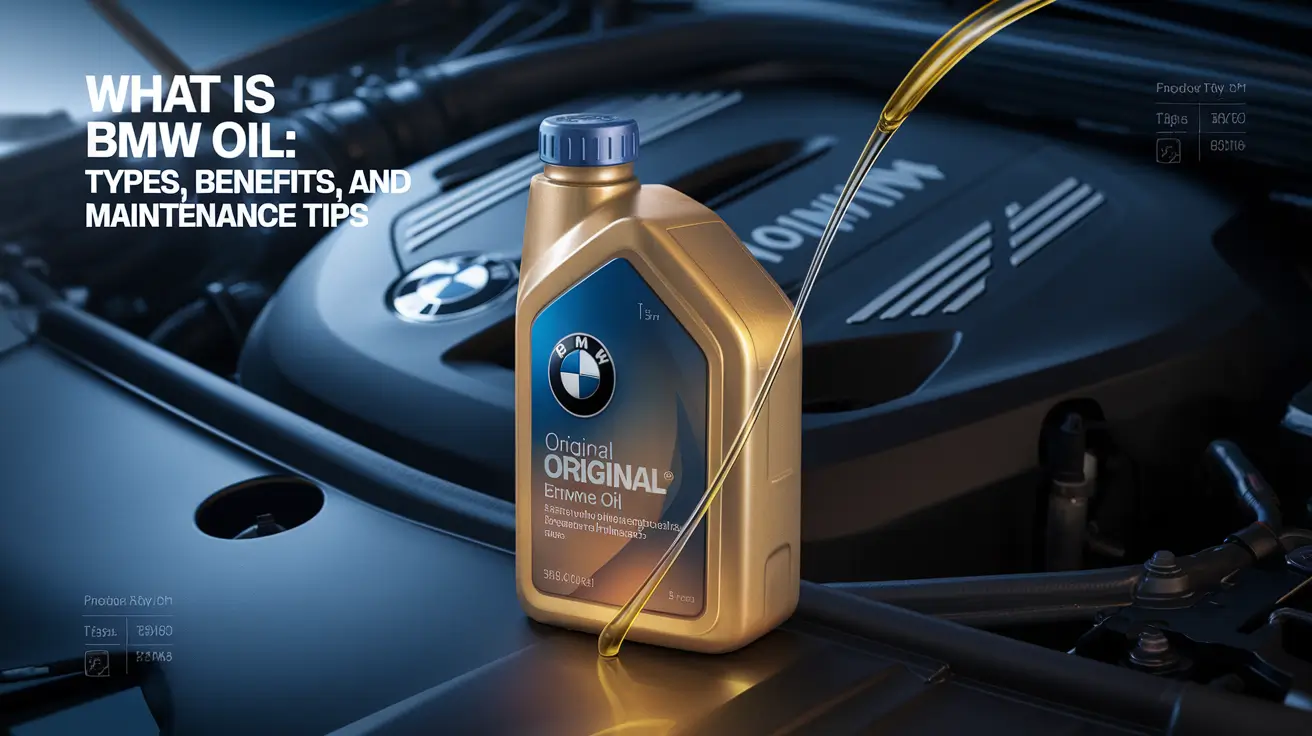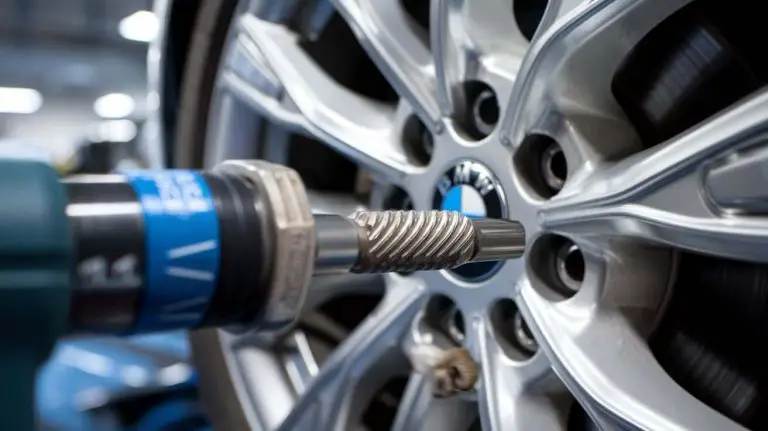What Is BMW Oil: Types, Benefits, and Maintenance Tips
BMW engine oil is key to keeping your car running well. As a BMW owner, it’s important to know that BMWs use only full synthetic oil. This oil is made to keep your engine well-lubricated, stable at high temperatures, and last longer.
Using the right BMW engine oil is vital. It ensures your car runs smoothly and efficiently. BMW’s use of top-quality synthetic oil shows their commitment to excellence.
Choosing the right BMW engine oil helps your car last longer and perform better. This is true for both new and older BMWs. Using the correct synthetic oil is essential for the best performance and longevity.
BMW Oil Components and Base Structure
The BMW oil is made with care for high-performance engines. It has three key parts: synthetic base oils, oil additives, and viscosity modifiers. These parts make BMW oils last long and work well.
Synthetic Base Oils
Synthetic base oils are the heart of BMW oils. They give better lubrication than regular oils. They also have fewer bad stuff and last longer against damage.
Brands like Motul and Castrol make top-notch synthetic base oils. They help cars use less fuel and make fewer emissions.
Performance Additives
Oil additives are key in BMW oils. They make the oil better in many ways. Additives like ZDDP protect the engine from wear and tear.
They also keep the engine clean by stopping sludge. This makes the engine run smoothly, no matter the driving conditions.
Viscosity Modifiers
Viscosity modifiers are important for BMW oils. They keep the oil working well in all temperatures. This is key for engines like BMW’s TwinPower Turbo.
They need consistent lubrication to run at their best. Viscosity modifiers help make sure that happens.
| Component | Function | Benefits |
|---|---|---|
| Synthetic Base Oils | Provide superior lubrication | Fewer impurities, better oxidation resistance |
| Oil Additives | Enhance oil properties | Protect engine components, prevent sludge |
| Viscosity Modifiers | Maintain oil performance | Stable viscosity in varying temperatures |
Types of BMW-Approved Engine Oils
Choosing the right oil is key for your BMW’s performance and life. BMW-approved oils keep your engine running smoothly and efficiently. Top picks include TwinPower Turbo Engine Oils and Advantec Synthetic Oil.
TwinPower Turbo Engine Oils come in Gold and Red. Gold is great for daily driving, protecting your engine and keeping it clean. Red is for high-performance engines, giving extra protection in tough conditions.
Advantec Synthetic Oil is a top choice by BMW. It offers better lubrication, less engine wear, and better fuel use. It’s known for longer oil change times and better engine health.
Using BMW-approved oils like TwinPower Turbo and Advantec Synthetic Oil protects your engine. It also keeps your warranty valid. Whether you drive a lot or push your BMW hard, the right oil ensures it runs well and lasts long.
In Charlotte, NC, Hendrick BMW CPO South Charlotte offers expert advice and top oil change services. Talk to their team to find the best BMW-approved oil for your car and how you drive.
BMW Oil Specifications and Standards
BMW oil standards are carefully made to keep engines running well and lasting long. These Longlife oil specs are updated often. This keeps up with new engine tech, emissions rules, and different fuel types worldwide.
BMW changes their oil formulas for many reasons. These include new engine designs, mileage and emissions needs, fuel types, regional differences, and service plans. This ensures BMWs work well in many conditions.
LL-01 Specification
The LL-01 spec was made for BMW’s high-performance engines. It was first for older models but has been updated. Now, it helps engines last longer and run better.
LL-04 Specification
LL-04 is better for turbocharged engines than LL-01. It has better heat and oxidation protection. This makes it great for BMWs with TwinPower Turbo tech.
LL-12 Specification
LL-12 is for BMW’s newest engines. It gives top-notch lubrication and support for advanced parts. It meets the needs of modern BMW engines, ensuring they perform well and meet strict emissions standards.
Viscosity Ratings for BMW Models
Choosing the right BMW oil viscosity is key for your engine’s best performance. The Society of Automotive Engineers (SAE) has a system called SAE ratings for BMW. It helps find the right oil thickness for various conditions.
Here are some common viscosity ratings:
- 5W-30: Great for a wide range of temperatures. It flows well in cold and protects well in warm weather.
- 0W-40: Best for high-performance engines. It offers top-notch lubrication in extreme temperatures.
BMW suggests specific viscosities based on the engine and where you drive. For example:
| BMW Model | Engine Type | Recommended Viscosity |
|---|---|---|
| BMW 3 Series | 2.0L Turbocharged | 5W-30 |
| BMW 5 Series | 3.0L V6 | 0W-40 |
| BMW X5 | 3.0L Diesel | 5W-30 |
| BMW M3 | 3.0L S55 | 0W-40 |
Climate and how you drive also affect the best BMW oil viscosity. In cold places, a lower first number (like 0W) helps oil flow better when starting. In hot areas, a higher second number (like 40) keeps oil from breaking down too much.
Original BMW Oil vs Aftermarket Options
Choosing the right oil is key for your BMW’s engine health. You can pick between OEM BMW oil and aftermarket BMW oil alternatives. Each option has its own benefits and things to consider.
Cost Comparison
OEM BMW oil is made just for BMW engines, ensuring top performance. It might cost more at first, but it could save you money later by avoiding engine problems. Aftermarket oils are cheaper and can save you a lot of money. But, prices change based on the brand and quality of the oil.
Here are some key points:
- OEM BMW oil: Typically higher price, guaranteed compatibility.
- Aftermarket alternatives: Lower cost, varying quality.
Performance Differences
Performance matters a lot when choosing between OEM and aftermarket oils. OEM BMW oil protects your engine well, supports full power, and keeps efficiency high. It’s made to meet BMW’s exact needs, ensuring your car lasts longer and runs smoothly.
Aftermarket BMW oil alternatives can match OEM performance if they meet BMW’s standards. Some brands offer oils as good as OEM, while others might not protect as well. It’s vital to choose well-known aftermarket oils to keep your BMW running great.
Oil Change Intervals for BMW Vehicles
Knowing when to change your BMW’s oil is key to keeping it in top shape. BMW suggests changing oil every 10,000 miles or 12 months for most cars. This helps keep the engine running well, thanks to advanced synthetic oils.
But, different BMWs need oil changes at different times. For example, BMW M series cars need oil every 7,500 miles because of their powerful engines. Older BMWs, even those bought used, should also get oil changes about every 7,500 miles or once a year. This keeps the engine safe and running well.
Older BMWs, like those with naturally aspirated engines, need oil changes every 5,000 miles or a year. These cars might not handle longer times without oil changes as well. So, regular maintenance is very important for their engines to last longer.
Several things can change how often you need to change your BMW’s oil. Driving habits, the weather, and how you use your car can all play a part. Short trips, very hot or cold weather, and towing heavy loads can mean you need oil changes more often. To find out the best schedule for your car, check your BMW’s manual or talk to a certified BMW tech.
| BMW Type | Recommended Oil Change Interval |
|---|---|
| Standard BMW Models | 10,000 miles or 12 months |
| BMW M Series | 7,500 miles |
| Pre-owned BMWs | 7,500 miles or 12 months |
| Vintage BMWs | 5,000 miles or 12 months |
Signs Your BMW Needs an Oil Change
Regular oil changes are key to keeping your BMW in top shape. Knowing when it’s time for an oil change can avoid engine problems and expensive fixes.
Dashboard Indicators
Your BMW’s dashboard shows important engine health signals. The oil warning light is a big one. It turns on when the oil level is low or the oil quality is bad.
- Oil Warning Light: Signals low oil levels or poor oil quality.
- Check Engine Light: May indicate engine performance issues related to oil problems.
Performance Changes
Changes in your BMW’s performance can mean it’s time for an oil change. Issues like lower fuel efficiency and strange engine noises are common signs.
- Decreased Fuel Efficiency: Old oil makes the engine work harder, reducing mileage.
- Unusual Engine Noises: Knocking or rumbling sounds indicate insufficient lubrication.
Physical Oil Appearance
Looking at your engine oil’s physical state can tell you a lot. Fresh oil is usually amber and smooth. But old oil looks dark and thick.
| Oil Color/Consistency | What It Indicates |
|---|---|
| Amber and Smooth | Oil is fresh and functioning properly. |
| Dark and Thick | Oil is old and may not lubricate effectively. |
| Milky Appearance | Possible coolant leak, requiring immediate attention. |
Common BMW Oil-Related Problems
BMW owners might face oil issues that harm engine performance and life. Knowing these problems helps keep your car in top shape.
- Excessive Oil Consumption: Some BMWs use more oil than others. This can cause the engine to run low if not checked often.
- Oil Leaks: Oil leaks are common. They can come from old seals, damaged oil pans, or loose caps. These leaks can seriously damage the engine if not fixed quickly.
- Oil Degradation: Engine oil can break down over time. This makes it less effective at lubricating engine parts. It can cause more wear and lower performance.
To spot these problems, check the oil level with the dipstick and look for leaks or oil spots under your car. If the oil light comes on, it might mean you need to add oil or have a bigger issue.
- Regularly check the oil to make sure it’s good and at the right level.
- Follow the oil change schedule for your BMW model.
- Use BMW-approved oil and filters for the best engine performance.
- Fix oil leaks or unusual oil use right away with a professional mechanic’s help.
| Issue | Possible Causes | Solutions |
|---|---|---|
| Excessive Oil Consumption | Worn piston rings, valve seals | Inspect and replace faulty seals or rings |
| Oil Leaks | Damaged gaskets, loose oil caps | Replace gaskets, tighten oil filler caps |
| Oil Degradation | Old oil, infrequent oil changes | Regular oil changes with recommended oil type |
Temperature Impact on BMW Oil Performance
Knowing the BMW oil temperature range is key to keeping your engine in top shape. Extreme temperatures can change how engine oil works. This affects both its efficiency and protection.
Cold Weather Considerations
In cold areas, starting your engine can be tough. Low temperatures make oil thicker, slowing its flow. The right oil helps by ensuring it lubricates well right away.
Let your BMW warm up until the oil hits at least 170°F. This lets the oil move smoothly, protecting your engine at the start. It also helps your engine last longer.
Hot Climate Requirements
Hot weather is hard on engine oil. High temperatures speed up oil breakdown, harming its quality. Choosing oil that stays stable in heat is vital.
BMW says oil should hit 180°F before you use Sport Plus mode. Keeping oil between 208°F-220°F keeps your engine running well and lasting longer.
| Condition | Recommended Oil Temperature | Notes |
|---|---|---|
| Cold Weather | ≥170°F | Ensure proper lubrication during start-up |
| Normal Driving | 208°F-220°F | Optimal range for most driving conditions |
| High-Performance Driving | ≥180°F (minimum) | Protects engine during intense use |
BMW Oil Storage and Handling
Proper management of your BMW’s engine oil is key for its performance and life. Storing and disposing of oil correctly can greatly help.
Storage Requirements
Keep your BMW oil in a cool, dry spot, away from sunlight. Make sure the oil container is always sealed. This prevents contamination and moisture.
- Avoid areas with extreme temperatures
- Store oil in its original container or a suitable, approved container
- Keep oil away from chemicals and solvents
Disposal Guidelines
Disposing of used oil the right way is good for the environment. Here’s how to do it:
- Drain the used oil from your BMW engine safely.
- Put the oil in a clean, leak-proof container with a tight lid.
- Find a local recycling center or a BMW dealership that takes used oil.
- Take the used oil to the disposal place without spills.
- Don’t throw oil in the trash, drains, or on the ground.
Following these steps keeps your car running well and helps the planet.
Selecting the Right Oil for Your BMW Series
Choosing the right oil is key for your BMW’s performance and life. The engine’s design, age, and how you drive affect oil choice.
Use our oil selection guide to find the best BMW model-specific oil for your vehicle:
- 3 Series: Full synthetic oil with a viscosity of 5W-30.
- 5 Series: BMW TwinPower Turbo Engine Oil, 5W-40.
- X Series: Synthetic oil suitable for high-mileage, 0W-30.
- M Models: Fully synthetic oil, 5W-50, for high-performance tuning.
Older BMWs and those with high mileage need special oils. These oils help reduce engine wear and keep efficiency up. Always check the BMW oil selection guide. This ensures you’re using oil that meets BMW Longlife-01 or Longlife-04 specs. The right oil protects your engine, keeps your BMW warranty valid, and boosts performance.
Below is a table summarizing recommended oils for different BMW series:
| BMW Series | Recommended Oil Type | Viscosity |
|---|---|---|
| 3 Series | Full Synthetic Oil | 5W-30 |
| 5 Series | BMW TwinPower Turbo Engine Oil | 5W-40 |
| X Series | Synthetic Oil for High-Mileage | 0W-30 |
| M Models | Fully Synthetic Oil | 5W-50 |
Closing Thoughts
Keeping your BMW in top shape starts with the right oil. Knowing how important BMW oil importance is helps you take better care of your car.
Using top-notch synthetic oils, as BMW suggests, offers the best protection. It keeps your engine running smoothly and lasts longer.
Don’t forget to change your oil regularly. BMW recommends doing it every 10,000 to 15,000 miles or once a year. This keeps your engine in great shape and prevents wear.
Deciding between original BMW oils and other brands affects your car’s performance and cost. Choosing the right oil means your car meets BMW’s standards and gives you a better driving experience.
Stay up-to-date with the latest oil technologies and BMW standards. This ensures your car gets the best protection and efficiency. Seeing oil maintenance as an investment helps keep your BMW healthy for years.
Use the knowledge from this guide to make smart choices about your BMW’s oil. Taking care of it now means a better drive tomorrow.







